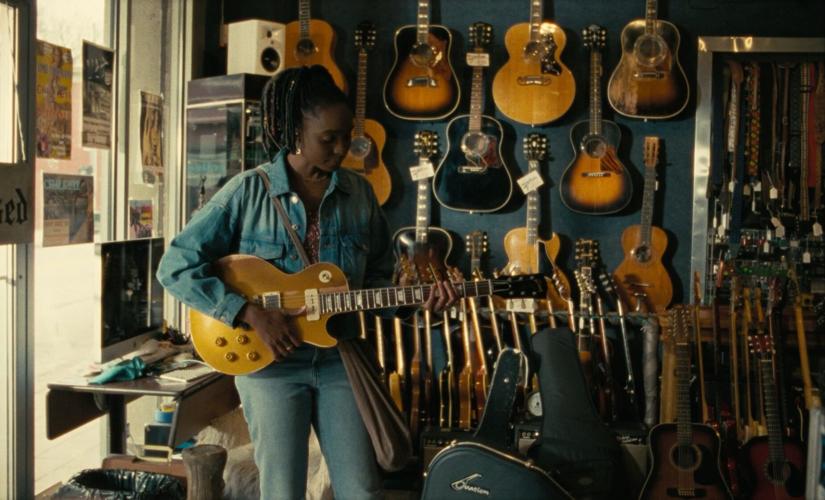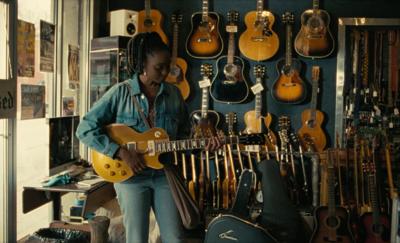Ever since Ava DuVernay's I Will Follow (2011), there has been a lack of films or stories about Black female musicians in genres outside R&B, Hip Hop or even Pop music. I Will Follow particularly comments on a Black female drummer in the Rock music genre. There's also been a lack of films about Black female songwriters, specifically focusing on their process of concocting or crafting songs. The sophomore feature by writer-director Nicole Riegel is one that attempts to rectify this dearth in representation.
Not since Chloé Zhao's films The Rider (2018) and Nomadland (2021) have I seen the state of South Dakota depicted so wonderfully and gloriously. At times, South Dakota is almost a character in Zhao's pictures. Riegel's film also utilizes the Mount Rushmore State, particularly the Badlands National Park. It's implied that the area or the geography is a factor in the artistic journey of Riegel's protagonist and Riegel suggests as much from a visual perspective, but, narrative-wise, it's more implied that a potential romance is as much a factor than anything else, which I didn't appreciate. I Will Follow didn't really focus on a romance and Nomadland was about a rejection of a romance, which I did appreciate greatly.

Kiki Layne (The Old Guard and If Beale Street Could Talk) stars as Theresa, a 40-year-old Black woman living in Cincinnati, Ohio. She's a singer-songwriter. She's mainly a guitarist. Yet, it's unclear if Layne actually learned to play the guitar, as the film frames her in a way that covers her not being able to strum realistically. However, her character's music is guitar-based. Theresa in fact could be classified as a folk, country or alternative artist. Yet, she rejects initially someone who suggests that her audience could be "rednecks."
The film never delves further into this idea. We never get any further scenes of Theresa who goes by the stage name of "Dandelion" exploring the idea of what genre of music she wants to make or who her audience would be. For many artists, the notion of classifying their music or putting themselves in a particular box is horrible and something they don't want to do. For many artists, they want to feel like they could do anything. However, the film begins with Theresa feeling frustrated over her lack of an audience and her lack of success. Yet, any artist's success is tied to marketing, how they identify and how they reach a target demographic. This film never considers that. Again, it prefers to focus on a rather lame romance.

Thomas Doherty (Gossip Girl and Descendants 2) co-stars as Casey, a Scottish singer-songwriter who Theresa meets in South Dakota when she goes there for an open mic competition. He invites her to play music with his band. He clearly is attracted and makes moves that indicate more than just a friendship. He rides a motorcycle and takes her on a trip through South Dakota, showing her various beautiful places. He then gets her to write a song with him.
Theresa and Casey have a bit of a whirlwind romance or an intense fling, but Theresa starts to question as to where this relationship will go. Given that she lives in Ohio and he perhaps lives in Scotland with no statement of what his immigration status is, there is a legitimate question of how long this romance will last. Other things are setup that indicate this romance is probably shaky. It's almost as if Riegel believes that like Taylor Swift, the only good music comes from brief intense romances, especially ones with bad breakups.

DANDELION - Still 5
Unfortunately, that implies that this Black woman couldn't have come up with any great music, if not for this White man she meets. Of course, there's nothing wrong with Theresa being inspired or encouraged by Casey or his music. There's also nothing wrong with Theresa being inspired by the artists she meets at the open mic in South Dakota. The majority of which are white. I'm just not sure why Theresa had to go all the way to South Dakota to do so.
Cincinnati, like a lot of cities, has a pretty good music scene. It was where Fats Waller, James Brown and Louis Armstrong got their starts. I would compare Theresa or Dandelion to Tracy Chapman who got her start in Cleveland, Ohio, a closer drive for Theresa than South Dakota. When she gets to Dakota and meets Casey and his band, it's as if she's never been around a community of musicians before. When she's in Cincinnati, we see she has a regular gig at a hotel bar or lounge. She doesn't seem to be a headliner but instead a house band. She performs live but not for people coming to see her but rather for whatever random people are in the hotel bar. She's frustrated by this because often the crowd pays no attention to her, but instead treat her as background. Given that she's 40, one would think that she would try to find a better venue or try marketing in a better way.

At the end of the film, we see Theresa having done exactly that. She performs at a venue called Ghost Baby, which is a lounge in downtown Cincinnati that's more dedicated to live music. There's no explanation of how she booked this venue and why she couldn't or didn't book this place before. This film is about her being frustrated over not having an audience or performing in a place she likes, but it then skips over how she actually does get an audience and starts performing in a place she likes. Her relationship with Casey almost felt incidental and seemingly had nothing to do with her later success. If anything, Theresa's fight with her mother, played by Melanie Nicholls-King (The Gilded Age and The Wire), had more impact on her career path than any interaction with Casey. As such, the majority of this film didn't really work for me.
Rated R for sexuality, nudity and language.
Running Time: 1 hr. and 53 mins.
In theaters.












